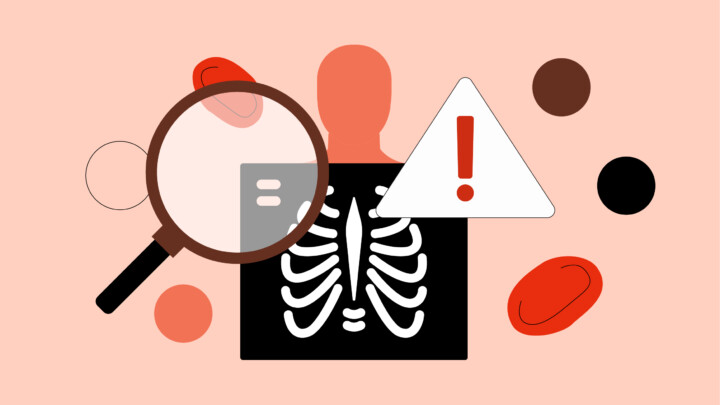
When asked, “How often do you feel overworked in your current position?” a challenging 88% of physicians on Sermo said they felt overworked at least occasionally..1
More than half, 53%, said they felt that way “all the time” or “most of the time.1” Just 11% responded with “rarely” or “never.1” And this isn’t just a Sermo-specific concern, as according to a 2022 AMA webinar, 52% of physicians reported experiencing a great deal of stress, up 4% from the previous year.1
Burnout has now become the second most significant barrier to providing patient care, cited by 21% of Sermo members.1 It’s a trend that seems to be only gaining traction and one that has prompted physicians around the world to speak within the Sermo community.
So, what does life as a doctor struggling with burnout actually look like? What’s driving this rise in doctor stress and what are the most effective ways to manage it? Using poll data and commentary from the Sermo community, this article explores the answers to those questions.
What are the signs of burnout in physicians?
For many physicians, burnout creeps in quietly, showing up as persistent exhaustion, emotional numbness and a fading sense of purpose.
“Burnout is the consequence of working day after day without stopping,2” wrote a GP on Sermo. Others echoed this sentiment, like a Radiologist who admitted, “I feel burnt out lately, I don’t believe in the national health system anymore.2” Elsewhere, an Endocrinologist added a darker note: “I’m already burnt out and want to retire.2”
The level of burnout doctors face can manifest in many ways, with exhaustion being particularly common. As an Anesthesiologist put it, “I feel overworked all the time… it’s exhausting.2” In some cases, basic needs are sidelined. “Doctors are exhausted… they can’t eat or even drink to avoid needing to urinate,” said a GP on Sermo.
When exhaustion becomes so normalized that basic self-care is ignored, it signals a dangerously unsustainable working environment that depletes energy, and worse, morale from healthcare workers.
This emotional fatigue often translates into hopelessness. “It’s exhausting to have so many responsibilities,2” said an Endocrinologist on Sermo. And from another: “I don’t have faith the healthcare system will get better… it’s messy.2” When physicians lose hope for improvement, retention drops, morale suffers and care quality is at risk.
Others report cognitive effects: “Burnout can impair memory and heighten anxiety… the amygdala becomes reactive,2” said an expert in Internal Medicine. This underlines how burnout isn’t just emotional but rather it physically changes how the brain works, affecting decision-making, concentration and safety in clinical care.
What’s driving physician stress in 2025?
The biggest causes of stress for doctors are multifactorial, but when physicians on Sermo were asked what contributes to feeling overworked, their answers highlighted a few consistent patterns.
Too many patients1
Nearly half of the respondents (46%) cited patient volume as their primary stressor. A GP on Sermo summed it up plainly: “Too much patient load with low numbers of working staff contribute to overworked stress and burnout.2”
Another GP on Sermo noted the effect on care quality: “The quality of patient care is affected daily by the volume of patients, preventing them from receiving the attention they deserve.2” Whereas a Pediatrician added a personal lens: “I don’t even have time to eat lunch. I give everything for my patients because it’s a life I save.2”
The volume of patients physicians are expected to see is testing their limits physically, emotionally and professionally. And that pressure isn’t just from their industry or wider society. Many physicians set high expectations for themselves, driven by a deep sense of duty to help as many patients as possible. It’s a commitment that can be as motivating as it is exhausting.
Lack of administrative support1
When support systems don’t function, the burden falls entirely on clinical staff, and 21% cite a lack of administrative support as their biggest cause of burnout. “Administrative lack of support is the biggest factor in work stress,2” said a Family Medicine physician and Sermo member. A Psychiatrist added, “My organization offers no meaningful support programs, leaving me feeling completely unsupported and overwhelmed.2”
Even small shifts in support culture could make a big difference. A Cardiologist on Sermo noted, “Professional mental health issues continue to be a major problem… changing administration could help.2”
Without effective administrative support, physicians are left to carry the full weight of a strained system: intensifying pressure, eroding morale and making meaningful change feel out of reach.
Call schedule1
Unpredictable hours and exhausting schedules are another common stressor, cited by 11% of Sermo respondents. “Sometimes it’s impossible to give the best attendance to my patients, having the time the hospital provides me per patient. I either work halfway through (not how I should) or do extra hours (unpaid),2” said an Obstetrics specialist. An Internal Medicine member on Sermo shared: “The call is killing me. Especially the 48-hour ones.2”
A Neurologist in the comments highlighted the compounding effect: “Long shifts without adequate support from other colleagues or administration.2”
Irregular and intense call schedules are leaving physicians physically drained and professionally unsupported, with little room to recover, making every shift feel like a step closer to burnout.
Prior authorizations1
Prior authorizations remain a frustrating burden for 10% of those surveyed. “The stress from the outpatient side comes from having to deal with payers not approving the treatment we want,2” said an Oncologist on Sermo. A Dermatologist added, “Prior authorizations and messaging is way too time consuming!2” Even an Oncologist contrasts inpatient vs. outpatient: “Outpatient stress comes from having to fight with them about the denial.2”
These comments showcase the administrative load and the demoralizing reality of having medical judgment questioned by systems built for cost control.
Death by inbox1
Digital overload has created a modern stressor: inbox fatigue, which is cited by 8% of respondents. “The dreaded in-basket… patients use messages to get care between visits,2” said a GP on Sermo. Another Physician added: “Whenever I get another request for records from insurance companies… I feel overworked.2”
One Psychiatrist on Sermo expressed it indirectly: “I try to get rid of uncooperative patients,2” referencing the emotional fallout of digital and administrative fatigue.
The constant stream of digital demands is blurring the line between clinical care and clerical work, draining time, focus and patience from physicians already stretched thin.
Are healthcare organizations doing enough?
When physicians on Sermo were asked if their organization is doing enough to reduce burdens:
- 23% said yes
- 55% said no and had ideas for improvement
- 21% said no and didn’t know how it could improve1
Most physicians feel their organizations aren’t doing enough to ease professional burdens, with over half saying they have ideas for improvement and one in five unsure where to begin.
For some, like one Psychiatrist on Sermo, the absence of basic support systems leaves them overwhelmed. Another Psychiatrist suggests deeper issues, pointing out that individual solutions like counselling won’t work without structural reform.2
These responses reveal that while physicians are actively managing their own stress, many believe that true progress depends on organizations acknowledging and addressing the systemic nature of the problem.
What do physicians say helps reduce stress?
How to manage stress as a doctor?
So, how can healthcare organizations find the solutions to their staff burnout?
The answer may lie in how doctors manage stress on their own. While only 10% use Employee Assistance Programs,1 one GP emphasizes the value of psychological support and structured interventions. Others suggest free consultations as an entry point.2
The most widely adopted ways for how physicians manage stress, however, are personal and deeply human: 45% turn to time with family and friends, 35% lean on hobbies and 7% seek counseling.1 These approaches offer connection, creativity and self-awareness, things the workplace often fails to provide. Some Sermo members find balance in music and therapy, while others credit hobbies and routine.2
For healthcare organizations, the lesson is that stress reduction shouldn’t rely solely on resilience training or optional wellness perks. It means building systems that protect time, recognize emotional labor and give clinicians space to reconnect with what matters, both at work and at home.
Your takeaway
Burnout is rising and physicians know exactly why.
Too many patients, too little support and systems that ignore the emotional weight of care are pushing clinicians to the edge.
Yet, doctors are also finding ways to cope, from creative outlets to strong personal networks.
If healthcare organizations want to retain and support their staff, they must listen, then act on what physicians say they need most.
Join the conversation on Sermo
If you’re a physician navigating the realities of burnout and stress, you’re not alone. Sermo is where doctors from around the world connect to share experiences, advice and support. Join today to access polls, peer insights and a community that understands what you’re facing, because your voice matters here.
Footnotes
- SERMO, 2024. Poll of the Week: Professional Stress Management [Poll]. SERMO Community. Available at: https://app.sermo.com/feed/for-you/post/1399429/expanded [Accessed 12 May 2025]
- SERMO member, 2024. Comment on Poll of the Week: Professional Stress Management [Poll]. SERMO Community [Private online forum]. Available at: https://app.sermo.com/feed/for-you/post/1399429/expanded [Accessed 12 May 2025]















